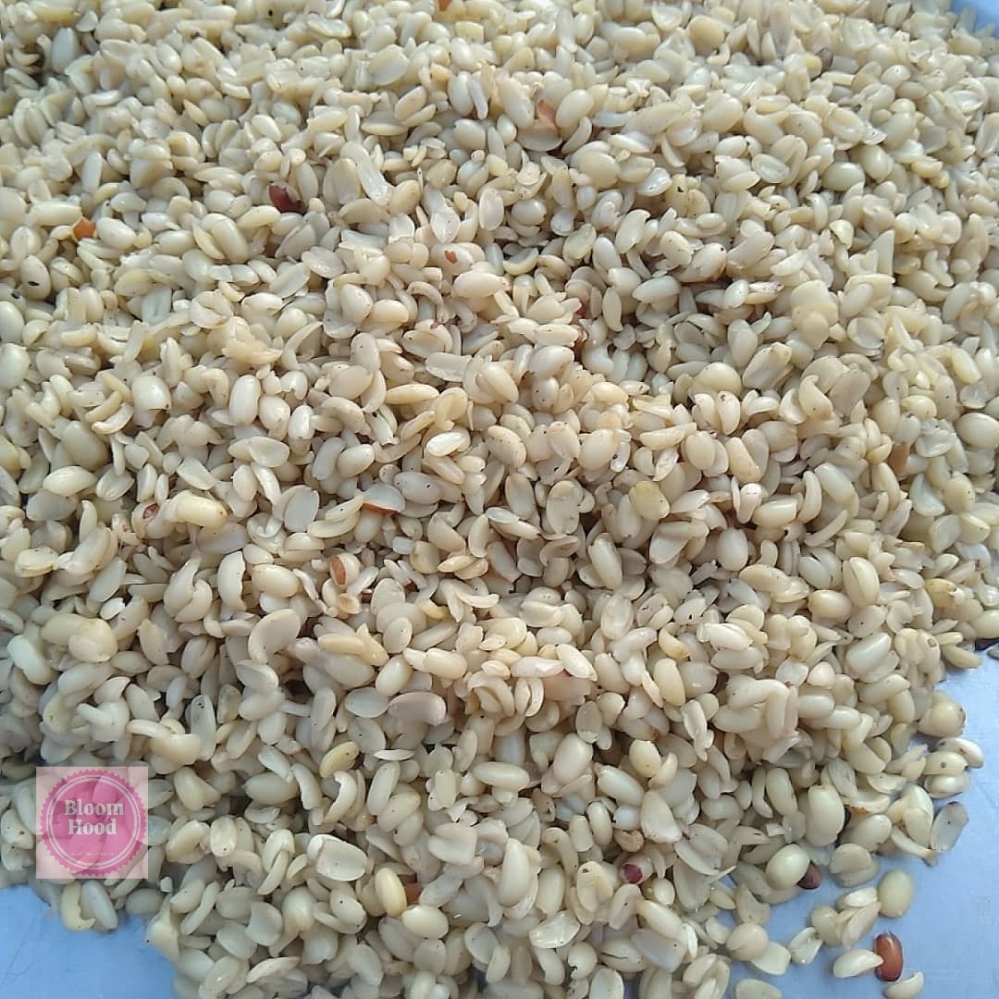In Igbo land (the eastern part of Nigeria), Ukwa is one of the special delicacies.
Not only is it a seasonal food but pricey too. It does not swell up while cooking like rice, yam or even beans would do.
So, to eat to your satisfaction, you have to buy as much as possible. In most occasions, it is mainly reserved for the VIP’s.
On the few occasions where it is made for the general group, many would seek it first before eating other foods.
Some Interesting Facts about Ukwa
- Its botanical name is Treculia Africana, African breadfruit in English, Ukwa in Igbo and Afon in Yoruba.
- It is grown in many tropical areas of Africa like Nigeria, Sudan, Senegal, Uganda, Tanzania, Angola and Madagascar.
- The Ukwa fruit is a big round pod (with an average weight of 6-9kg) and the tree can grow as high as 9-20m. Even some species can grow as high as 30m.
Therefore, you can imagine what a great fall that would be comparing its weight and height of fall.
- Due to this fact, it is grown far away from houses and fences. So that when it falls, it will not cause any damage.
- Also, people refrain from sleeping or passing underneath, especially during the ripening stage, a fall from such a high altitude and weight can kill eventually anybody.
- No one is allowed to pluck it as the Ukwa fruit falls on its own after it ripens.
- In many communities, when it falls, anyone can take it. It is usually a first-see, first-pick scenario.

Just as my grandma would always do when we ask her to tell us the story of Ukwa, she will start first by saying “know how to cook it first before the tale”.
How to Cook Ukwa Porridge
- Rinse the Ukwa in water and cook till tender
- Add pounded pepper, red oil, ogili, and salt to taste
- Add dry fish and then
- Sparingly add the onugbu leave
Note
- For some who would prefer eating their Ukwa with Ukwa water, pour out a glassful of the water when it is well cooked and before adding the ingredients.
- To speed the cooking process, some may add potash or soak in water overnight before cooking.
Then, here comes the “Tale of Ukwa”, as my granny would always tell.
There is this village in a faraway Igbo land, well known for its lush landscapes, lively people and cool deep rivers.
In this village resides a mid-elderly woman known by the villagers as Mama Ngozi.
The villagers respected her so much for her deep connections to the land especially where it concerns her love and devotion to the big Ukwa Tree which is located at the village square.
Many of the villagers believed the Ukwa tree was a divine gift given to them by the god of agriculture – Ahiajoku, to sustain the habitants in due season.
The fruits of this Ukwa tree are the biggest in the whole land, concealed by rough exteriors, housing a bounty of nutritious seeds.
With her big but soft hands, she would nurture the tree and gather ripe Ukwa fruits. At the same time, teaches the younger generations to value the fruit and see the importance of cherishing nature’s gifts.

When it comes to Ukwa’s nutritional profile, it is rich in;
- Fibre
- Protein
- Lipid
- Minerals like Potassium, Iron, Calcium, Zinc, Magnesium, Phosphorus etc.
- Carbohydrates
- Ash
- Vitamin B and C
- Beta-carotene
She would go further to emphasize the benefits of Ukwa seeds and trees for health,
- The Ukwa fruit helps to promote digestive health as it contains a lot of dietary fibre.
- It may boost wound healing due to its high content of zinc and antioxidants.
- The stem and leaves have antimicrobial properties too and will help kill germs on wounds.
- It stabilizes blood sugar levels. The decoction of the roots is anti-hyperglycaemic, meaning it counters the accumulation of excess sugar in the blood.
- The leaves’ crude extract treats thrush and throat infections by applying it on the inner tongue.
- The decoction of various parts of the plant helps fight whooping cough and asthma due to its anti-inflammatory abilities.
- In some communities, the decoction of the bark, leaves and roots is a good remedy for gastro-intestinal infections.
- Drinking the extract of the boiled leaves can also lower blood pressure.
- Squeeze out the juice from the fresh leaves to administer for cough, bacterial (ear) infections, rashes, malaria etc.
- The tree contains some latex, which is useful as an eardrop to treat ear bacterial infections.
- The ashes from the leaves may cure an enlarged spleen.
Spiritual Significance of the Ukwa Tree
In addition to the above benefits, the significance of Ukwa extends beyond physical well-being.
Mama Ngozi went along to share more stories of how;
- The seeds fostered unity and community spirit among those who reverence it.
- To them, it became a symbol of abundance, resilience, and harmony with nature.
For those who believed in its ritual connotation;
- Ukwa fruit is a symbol of fertility for women.
With each meal the villagers enjoy together, they grow stronger, healthier, and more connected.
On one of such gatherings, they decided to tend to the Ukwa tree collectively, (Not leaving it only for Mama Ngozi), thus, ensuring their prosperity for generations to come.
This created a deeper connection between nature’s gifts and the community’s holistic well-being.
So, as long as the Ukwa trees flourish, also will the hearts and minds of the villagers, forever united in gratitude.

